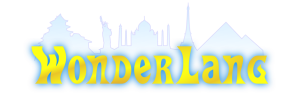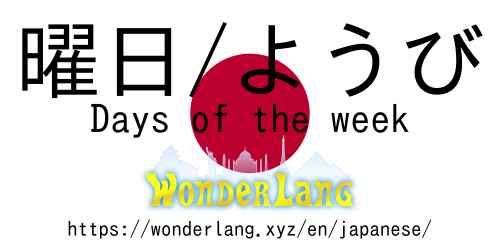Hello!
In this lesson we are going to learn of to ask for and how to indicate days of the week in Japanese.
Let’s go!
Day of the week
One of the key words to know when dealing with days of the week is: 曜日 (ようび) [yo~bi] /day (of the week)/
What day is it today?
Having this word in mind, to ask someone “What day it is today?”, you will say:
In more casual situations, the 今日は [kyō wa] can be dropped and the question become:
Which means: /What day is it?/.
Days of the week
Days of the week in Japanese are build quite like days in our western languages, as for instance Monday (Moon’s day), Tuesday (Tiw’s – Tiw is a Norse divinity – day)… in English for instance, day’s in Japanese are build around stars, followed by 曜日[yo~bi]:
| 日曜日 | にちようび | nichiyōbi | Sunday | 日 is the Sun. |
| 月曜日 | げつようび | getsuyōbi | Monday | 月 is the Moon. |
| 火曜日 | かようび | kayōbi | Tuesday | 火 is the fire symbolizing Mars. |
| 水曜日 | すいようび | suiyōbi | Wednesday | 水 is the water symbolizing Mercury |
| 木曜日 | もくようび | mokuyōbi | Thursday | 木 is the wood symbolizing Jupiter |
| 金曜日 | きんようび | kinyōbi | Friday | 金 is gold/silver symbolizing Venus |
| 土曜日 | どようび | doyōbi | Saturday | 土 is the soil symbolizing Saturn |
So, to answer the question: 今日は何曜日ですか。[What day is it today], you will answer (if today is Saturday for instance):
/Today is Saturday./
or more simply:
/Saturday./
Note also that the pronunciation indicated above is the formal way to indicate days. But in everyday life this may be long to pronounce and write, so many times, when speaking or writing, the final 日(び) is dropped, and even more in written form the 曜日 (ようび) is entirely dropped.
For instance look at the following which is a concert date:
ONE OK ROCK 2017 “Ambitions” JAPAN TOUR
■2017/02/18(土) 静岡 : 静岡エコパアリーナ
【開場/開演】OPEN 17:00 / START 18:00 <SPECIAL GUEST; WANIMA>
【一般発売日】2017/01/21(土) 【問い合わせ】サンデーフォークプロモーション静岡
 |
 |
 |
 |
 |
|||
Exercises
Answer the question in Japanese
今日は何曜日ですか。/What day is it today?/
(Refer to the table above to check your answer ^^)
Guess what is the day corresponding to the given Japanese day
Pronounce the day in Japanese
That’s it. We are finished with this lesson. Next time we will learn how to speak of yesterday or tomorrow what remains to fully master time: dates and years.
Cheers,
Stéphane
Follow us:
